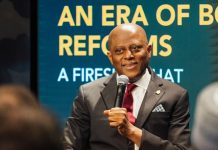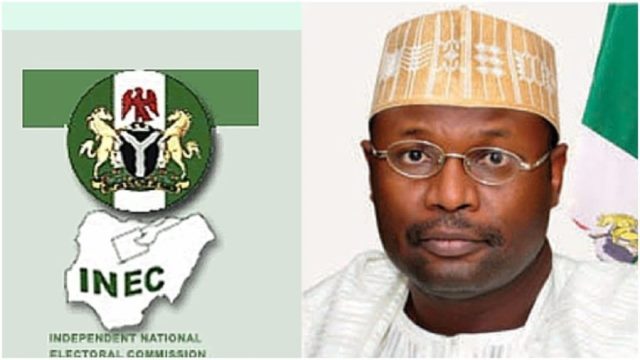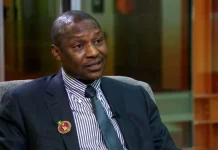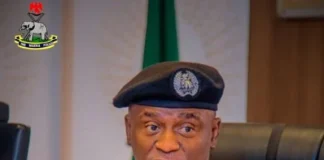The Independent National Electoral Commission (INEC) Wednesday said it would consider extending the Continuous Voters Registration (CVR) exercise which was supposed to end on August 17.
The electoral body has also said it will immediately investigate cases of alleged infractions leveled against some of its staff in the local government areas of Niger State in the CVR exercise.
Though INEC did not reveal the duration the extension would last, the commission however said it might ßextend voters’ registration if it becomes necessary and exigent to do so.
There have been concern and public outcry over the need to extend the voters’ registration beyond the August 17 deadline given the constitutional requirement that the exercise be held not earlier than 60 days to the elections.
The Chairman of the commission, Prof. Mahmood Yakubu, made this known while playing host to ‘OurMumuDonDo’ group, led by Charles Oputa, also known as Charly Boy; presidential candidates, Mr. Omoyele Sowore; presidential candidate of Young Peoples Party; Prof. Kingsley Monghalu; Deji Adeyanju; Ralph Adebayo among others.
The group, in a letter presented to the INEC chairman and signed by Oputa on behalf of the group, observed that since the commission announced that it will suspend the CVR exercise, the movement, other notable groups, individuals and visionary young presidential aspirants who relate with the electorate have been inundated with calls and complaints from frustrated Nigerians across the country who are still unable to register as eligible voters.
The group stressed that while it commended lNEC for the improvements in the exercise, the extension of time on daily basis to between ‘9a.m. and 5p.m. and the grace to register on Saturday and Sunday, and in as much as these adjustments are welcome, they did not capture the real essence of making the registration a continuous exercise as guaranteed by the Electoral Act, 2010.
They added that those born after May 29, 1999, would be eligible by age to vote for the first time, stating that “every day of the year 2018, scores of these children are attaining the age of 18 and many of them are eager and excited to participate in the 2019 elections.”
The group said: “Fortunately, these children have been handed the grace to register up to 60 days to the general elections by the Electoral Act in accordance with Section 9 (5), which states that the registration of voters, updating and revision of the register of voters under this section shall stop not later than 60 days before any election covered by this Act.
“It is therefore our demand that the exercise be extended to December 14, 2018, in accordance with the 60 days before the first election as guaranteed by the Electoral Act, 2010, so justice would be seen to have been done to everyone, at least within the limits of our laws.
“We can, however, concede to lNEC that only those who are able to register before October 16 or earlier, would be able to collect their PVC since it can take an average of 120 days to produce and distribute these cards. However, the registration should remain a continuous one as part of the lNEC’s daily responsibility to the Nigerians.”
While speaking, INEC chairman said the commission is aware that the credibility of any election rests on the credibility of the voters register, and as such, citizens must be given the opportunity to register, noting that that is what the commission is trying to do within the constraints of the available resources.
Yakubu explained that the electoral Act, Section 9 (5), which the group cited to back up its claims did not say not ‘earlier’ than 60 days, rather not ‘later’ than 60 days.
According to him, “Ordinarily, we would like to continue, probably until very close to the election, necessarily the 60 days, but there are a number of activities that the commission has to undertake before we finalise the register, display the register for claims and objections by the citizens and make sure that we print three copies of the register-one in colour, two in black and white, and make this available to all polling units and voting points nationwide.”
He maintained that the decision was not a unilateral decision by INEC, but was a collective decision reached after a consultative meeting with all political parties, CSOs and media who all advised that the registration be suspended in the middle of August.
According to him, “So far, as at August 15, 11.4 million Nigerians have since been registered, making a total of over 80 million Nigerians that have been registered for the 2019 general election.’’
Yakubu stressed that the commission has received, and it’s processing 569,000 requests for transfer of PVCs, and has also received 909 requests for damaged PVCs so far for replacement.
He stated: “We have 120,000 polling units, in addition, we have 60,000 voting points, making a total number of 180,000 places where citizens would vote in 2019, this is a herculean task. We need time to be able to do so.
“The printing and distribution of PVCs also take time, so we reckon that the commission will require 180 days, between the end of this registration to the time the cards are distributed to the voters and the register is prepared for the 2019 general election.’’
Meanwhile, the electoral body in Niger State has said it will immediately investigate cases of alleged infractions leveled against some of its staff in the local government areas of the state in the CVR.
The state Resident Electoral Commissioner (REC), Professor Samuel Egwu, made the promise in Minna yesterday while reacting to some illegal activities of staff in Paiko, Suleja and Wishishi Local government Areas of the state.
Egwu said the investigation would determine the veracity or not of the allegations promised that any staff found to have violated the code of ethics of their jobs would be dealt with according to the law.
The REC confirmed the shortage of some materials needed for the continuous voter exercise, but said the national headquarters of the organisation was already looking into the problem.
“Shortage of material is all over the place, new set of materials are already being released, only yesterday (Tuesday), we received some materials and we are sending them to the local government areas.
“Registration is free; no Nigerian should be asked to pay for anything,” Professor Egwu said.
With the CVR exercise which started since 2017, registering seven million eligible voters, the number of Nigerians registered to vote in the 2019 general election has reached 77 million.
Egwu said the CVR started in April 2017 in the state, and had recorded 93,208 with 82,896 Permanent Voters Cards (PVCs) issued, adding that in 2018, over 198,038 were registered, and that between 2011 and 2014, 132,000 PVCs had remained uncollected.
Urging eligible voters to take advantage of the ongoing exercise, Egwu reminded Nigerians that “PVCs are based on biometric technology and require due diligence and complex business processes including the requirements of Nigerians procurement laws before they are printed.”












